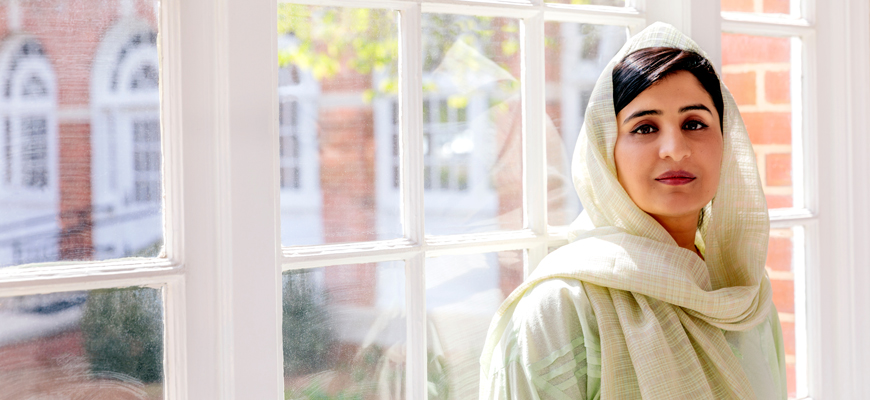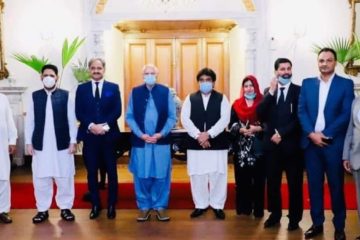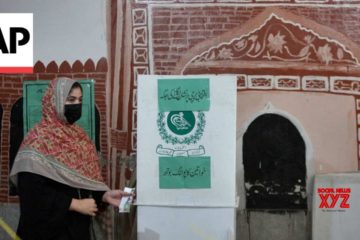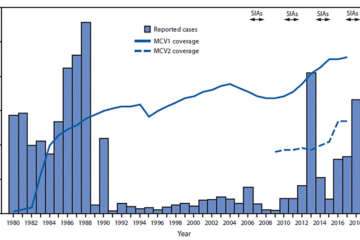UofSC student strives to provide education for Pakistani women – SC.edu

Khadija Kakar and her brothers and sisters grew up in Balochistan, Pakistan, an impoverished
province where women are often discouraged from attending college — not only by society
but sometimes by friends and family. Kakar’s mother was a widow, which made the hardships
even more challenging.
Nevertheless, she supported the family, spared no effort to ensure all of her children
went to school, and pushed Pakistani cultural pressures by encouraging her daughters
to get an education so they could have more opportunities for a better life.
With her mother as inspiration, Kakar overcame cultural adversity in her native Pakistan
and today is a Fulbright Scholar and third-year Ph.D. student studying biomedical
science at the University of South Carolina School of Medicine Columbia.
“I saw her, throughout her entire life, as a widowed woman, despite the conditions,
push for our education, have quality of life, look for our better future,” Kakar says.
“I used to think that if a single, widowed and unemployed woman can bring such change
and can raise children then, definitely, a woman who is educated and is employed can
make even bigger change.”
Kakar’s encounter with a frightened young boy brought more validity to the ugly truth
about living in poverty in a province that faced lack of education, lack of resources,
drug addiction and economic collapse.
“It was dark night with heavy rain, and there was a small kid of about 6 or 7 years
old banging on our door and asking for help,” Kakar says.
My path toward education was an improbable act. My mother pushed for my education
against all odds and strong cultural pressures.
Khadija Kakar, Ph.D. student
The boy said his mom was suffering because they didn’t have money to pay for her painkiller.
After learning about the hardships the woman and her son were facing, Kakar paid the
woman’s medical bills. That act of kindness was not a one-time thing.
“I decided since then that I will get the best education and, as soon as I’m employed,
I’ll start helping those people who are underprivileged and who don’t have any education.”
Studies show that Balochistan is Pakistan’s poorest province. Although the prime minister announced a $1.5 billion subsidy program last November
to mitigate hardships, Balochistan, which accounts for nearly half of Pakistan’s territory,
has low representation among social protection programs.
For eight years now, Kakar has been helping people in Pakistan. Using leave-with-pay
money from her job in Balochistan, she’s aided girls who were interested in studying
but could not afford it, providing tuition, books and transportation to and from school
for them. When a promotion increased her income, Kakar gave money to other families
in need. Nine students and four families – ranging in age from around 6 to 70 – are
currently benefiting from her generosity. Kakar’s sister joined her efforts four years
ago, and their family in Pakistan helps them identify individuals or families that
need assistance.
Khadija Kakar spends much of her time in the lab at the School of Medicine Columbia
doing research as she studies biomedical science.
Now, Kakar is setting her sights on creating an organization to offer the same kind
of aid on a larger scale and is hoping to use knowledge and connections she gained
at a Fulbright awards ceremony in March. She was the only UofSC Fulbright scholar
selected to attend the ceremony in Washington D.C., at which U2 Lead Singer Bono was
awarded the Fulbright Prize for International Understanding for his commitment to fighting injustice, extreme poverty and the global AIDS crisis.
The hotel ballroom full of people dedicated to successful charitable work offered
a way for Kakar to learn how she can create an organization to provide resources for
her cause. In addition to formation examples and advice from fellow advocates, she
also made some recruitments.
“I met a lady from Balochistan who is living in Washington, D.C., and working in public
health sector. She is interested to be part of my organization,” Kakar says. “One
of my friends from Virginia Tech also showed her interest. I hope we all together
will take an initiative for this cause soon.”
Kakar was accepted into the Fulbright Program and came to the United States in 2019.
The international education program provides exchanges between the U.S. and more
than 160 countries and focuses on promoting mutual understanding through academic
and bicultural exchange. South Carolina was deemed the best fit for Kakar based on
her research proposal regarding biomedical science in the field of immunology.
Her favorite place at UofSC is the School of Medicine’s lab, which Kakar says contains
the latest equipment to aid research. But, she adds, the best thing about the state’s
flagship university is the diversity.
“You will meet many different people and hear them proud and amicable and cheering
for you,” she says. “I like the environment and I like the people and I like the culture.”
Kakar has visited her family in Pakistan one time since leaving the country three
years ago. She says when she sees the deprived condition of some of the women in Balochistan,
she remembers her mother and her belief that education can change society and improve
the quality of life.
“My path toward education was an improbable act. My mother pushed for my education
against all odds and strong cultural pressures,” Kakar says. “No words can express
my feelings or my motivation to serve my area and help the underserved. My goal as
an educated woman is to shape the future of my country by educating the women of Balochistan.”
Share this Story! Let friends in your social network know what you are reading about













